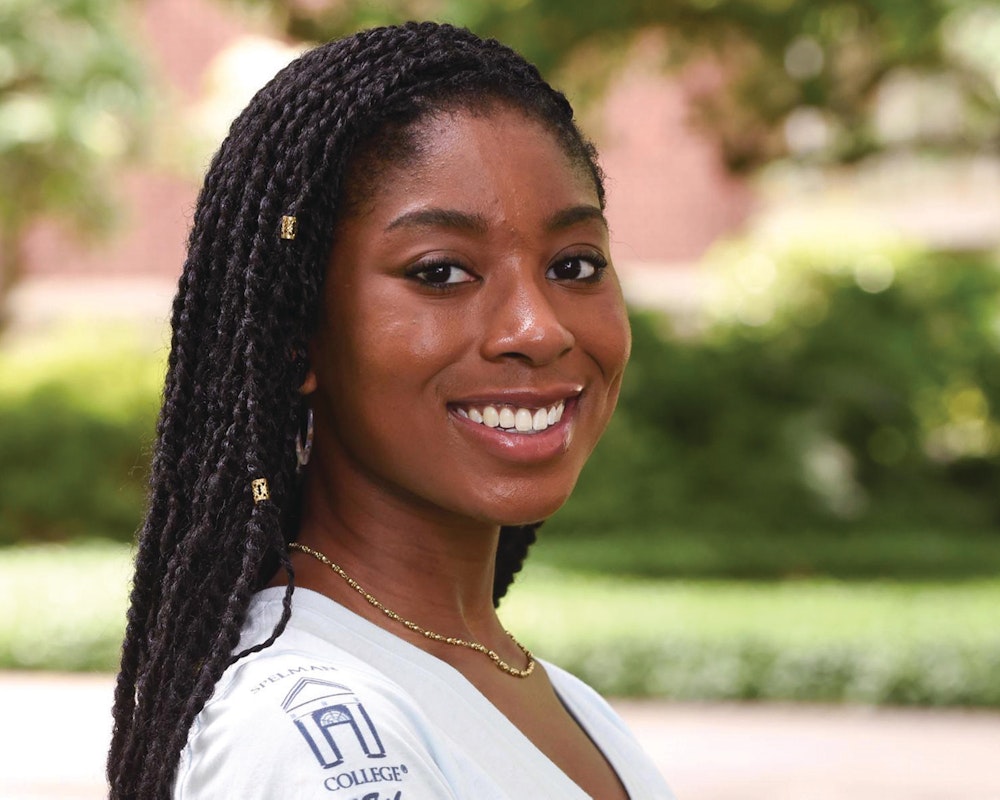
Walking the Talk
Black experiences need to be an integral part of college curricula
During my first year at Spelman College, I completed an audio narrative project for my African Diaspora and the World (ADW) program. I looked at how the contemporary artist Amy Sherald uses portraiture—as in her painting Mama has made the bread. (How things are measured)—to challenge hierarchies of race, class, gender, and sexuality. I then drew connections between Sherald’s work and the Harlem Renaissance literary magazine Fire!!, published by a group of Black American authors including Zora Neale Hurston and Gwendolyn Bennett. Fire!! challenged the 1920s identity politics, informed by white supremacy, that made it difficult for Black Americans to feel comfortable writing and talking about sexuality, interracial relationships, and color prejudice.
Looking back on my first two years at Spelman, a historically Black liberal arts college for women, I can see that ADW has been paramount to my development as a culturally competent scholar with a nuanced understanding of systemic racism. In the majority-White schools I attended for much of my life, Black history and literature were an afterthought. But my mother, a Spelman alumna and brilliant cultural anthropologist, constantly reminded me of Black people’s achievements, planting the seeds of my love of myself and my people. At Spelman, and specifically through ADW, those seeds have blossomed.
ADW provides a multifaceted foundation based on Black people’s histories everywhere, while taking the necessary care to not portray Black experiences as monolithic. The resilience, triumph, and genius of Black people in the United States and worldwide are awe-inspiring yet vastly understudied and misunderstood. As Black Lives Matter demonstrators continue to protest racial injustice, and as we witness the racial disparities in the communities hit hardest by the COVID-19 pandemic, it is clearer than ever that the need for a curriculum like the one taught in ADW is needed at all colleges and universities.
Spelman College implemented the required two-course ADW program for first-year students in the early 1990s. The program aims to center histories of Africa and its people, prepare students to perceive themselves as global citizens, heighten the awareness of diverse cultural and historical experiences, and emphasize the connection between education and social change.
In the ADW program, my classmates and I learned to challenge systems, beginning with the education system, by analyzing Paulo Freire’s Pedagogy of the Oppressed. We were introduced to Négritude, Pan-Africanism, and Negrismo and learned the names and dates of independence of African countries. I applied my learning of Pan-Africanism and the “Back to Africa” movement to my research prospectus for the Mellon Mays Undergraduate Fellowship and spent summer 2020 preparing to conduct ethnographic research on Black American women expatriating to Senegal.
Imagine how different our world would look if all of us were offered a gender-informed, interdisciplinary study of Africa’s histories, cultures, and diaspora, and by extension if all of us valued Black life. Breonna Taylor, Ahmaud Arbery, Elijah McClain, Sandra Bland, and George Floyd might still be with us. My grandparents, and thousands of other Black people—who have been disproportionately affected by the pandemic—might not have caught and suffered from COVID-19.
In addition to issuing press releases declaring solidarity with Black students and expressing condolences for the loss of innocent Black lives, I urge leaders of American colleges and universities to make coursework similar to that in the ADW program a mandatory part of their curricula.